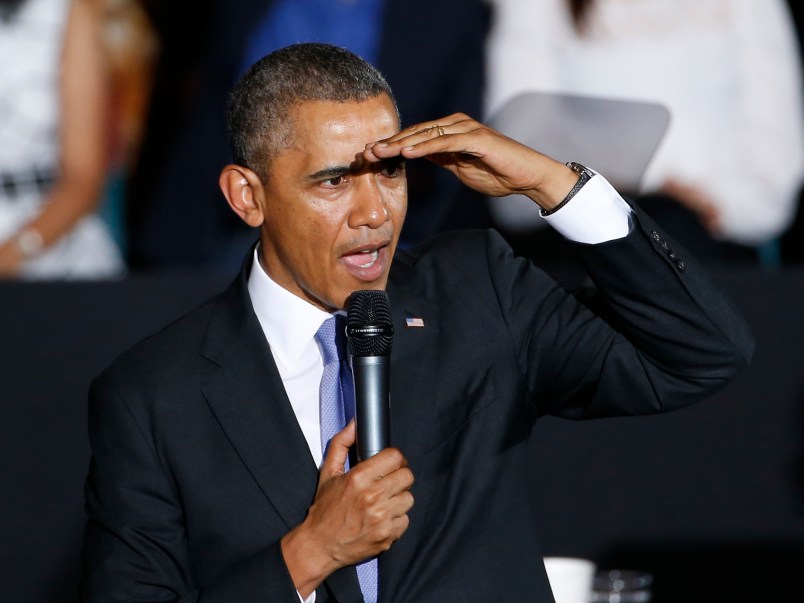Amid fading prospects for immigration reform in Congress, President Barack Obama has signaled he’ll take executive action on enforcement to ease the burden for certain people in the country illegally who don’t have criminal records. On his order, Homeland Security Secretary Jeh Johnson is conducting a review of U.S. enforcement policies in order to determine how to implement the law in the smartest and most humane way.
Immigration lawyers generally agree that the president has broad legal authority when it comes to prioritizing who to deport. There is debate, however, about how far he can go in formally granting relief and work authorization to undocumented immigrants. Department of Homeland Security officials emphasize that no decisions have been made and a variety of options are under consideration.
One area where DHS feels confident in its authority to act is the prioritization enforcement resources, sources familiar with the matter say. Under the legal theory of “prosecutorial discretion,” the department could decide, for instance, to prioritize removal of dangerous criminals who pose serious safety threats, such as gang members, drug dealers and repeat offenders. It could in turn de-prioritize action against those who have not committed crimes, (or committed lower-level crimes like DUIs) and steer resources away from those who have family ties in the U.S. and have lived here for a certain period of time.
Under this approach, undocumented immigrants would technically remain subject to deportation. They’d simply be less likely to get picked up by the system.
A second category of executive action is more contentious: to formally let certain subsets of immigrants temporarily live in the U.S. without fear of deportation and perhaps apply for employment authorization. This would build upon the Obama administration’s 2012 Deferred Action for Childhood Arrivals (DACA) program which granted two-year relief to certain young people brought to the country as children, referred to as DREAMers.
The Obama administration feels less comfortable with expanding DACA because the legal issues are trickier. Granting a reprieve to a narrow, specific population arguably falls within the realm of enforcement discretion. But applying it to broader populations becomes problematic and may backfire legally and politically, as some immigration law experts have cautioned.
“Republicans may challenge his actions in Court saying that they constitute a violation of the Separation of Powers,” said Eli Kantor, an immigration lawyer based in Beverly Hills, California.
But experts also say there’s no legal basis for saying DACA is as far as the president can go unilaterally. The American Immigration Lawyers Association has recommended an expanded deferred action program for close family members (including parents, children, spouses and siblings) of U.S. citizens, lawful permanent residents and DACA beneficiaries.
“Technically under the law there is not a specific constraint preventing the president from designating a broad category of individuals for whom he’s going to suspend enforcement against,” said Greg Chen, advocacy director for AILA.
Obama is being squeezed on both ends, by pro-immigration activists who are demanding relief (which includes being derisively labeled the “deporter-in-chief“), and by Republicans who are demanding he be more vigorous in cracking down on those who have violated immigration laws.
DHS spokesman Peter Boogaard told TPM that Johnson is seeking input from his advisers and law enforcement actors as well as members of Congress and proponents and opponents of expanded relief for undocumented immigrants. He is considering “a diverse set of views and opinions in order to assess areas where we can further align our enforcement policies with our goal of sound law enforcement practice that prioritizes public safety,” Boogaard said.
The one thing the president certainly cannot do is grant legal status to anyone in the country without proper documentation. “That’s absolutely Congress’s authority,” Chen said. That means any executive action Obama takes would, by definition, be temporary and theoretically reversible by the next president.
“You’re still in limbo status,” Chen said.










